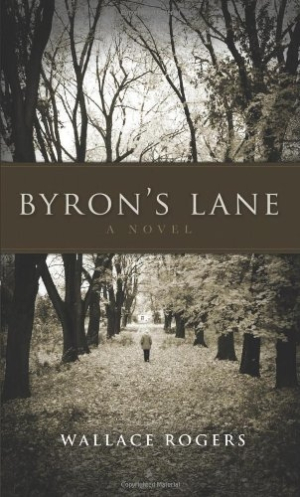Byron's Lane
The plot of Byron’s Lane unfolds like a spring fern—one frond at a time; it is a story of intrigue to be savored slowly.
Wallace Rogers’s splendid novel, Byron’s Lane, defies easy description. It is a tale of mystery and intrigue infused with political opinions and commentary on love and friendship, guilt and absolution, rejection and achievement.
In the tradition of Sherlock Holmes’s companion Dr. Watson, publisher and astute observer Tom Walker narrates the saga of his lifelong friend, Jonathan Adams, who “loved dancing on the rims of volcanoes.” Adams is an accomplished and complex man tortured by grisly memories and crippling insecurities. Generally considered “the conscience of Minnesota’s Democratic Party,” he is as drawn to liberal causes and social responsibility as he is “dangerously attracted to fragile, beautiful women who [seek] his advice and his attention.” According to Walker, Adams is a man “as incapable of managing his own life as he was abundantly blessed in his ability to take care of the rest of us.”
Rogers is a professor of government and public administration and manager of a consulting business that specializes in organizing, evaluating, and building the capacity of local governments in developing countries. He has worked in Afghanistan, Iraq, Eastern Europe, and the Pacific. His knowledge of these topics shines in Byron’s Lane as he instructs readers without being pedantic.
Rogers is also a gifted writer. His clear prose is sprinkled with apt analogies. “‘My rearview mirror is suddenly filled with the silver grill of a Mack truck hauling a heavy load of reality and squandered time,’” says Adams. “I looked at him and frowned. Adams was consumed by the blast of the truck’s bellowing horn. But he was incapable of changing lanes.”
Characters, both major and minor, are well developed, and their dialogue rings true. One (Christina) articulates the existential questions that permeate the novel: “‘What makes us fragile and dissatisfied when we have every reason to be confident and content? Why are we so sad and vulnerable in the midst of having so much?’”
The plot unfolds like a spring fern—one frond at a time; the novel isn’t for readers who require a fast-paced thrill ride. Rather, it is a story of intrigue to be savored slowly while sitting in an overstuffed chair, feet up on the ottoman, sipping good bourbon before the fire. Byron’s Lane is for thinkers willing to confront personal demons as they reflect on their own lives.
The book includes several plot twists that heighten interest, and Rogers’s eye for detail produces lovely prose. Baby Boomers in particular will appreciate the spot-on descriptions of small town Ohio life in the 1950s: “We watched our parents dilute one part top-shelf vodka with four parts Minute Maid frozen orange juice. We seasoned our view of the world with half a teaspoon of racism.” Younger readers will relate to contemporary descriptions of war-torn Iraq and Afghanistan and the detritus those conflagrations are leaving in their wake.
Byron’s Lane is a book well worth picking up. Its strong characters and probing questions will haunt readers long after the last page has been turned.
Reviewed by
Nancy Walker
Disclosure: This article is not an endorsement, but a review. The publisher of this book provided free copies of the book and paid a small fee to have their book reviewed by a professional reviewer. Foreword Reviews and Clarion Reviews make no guarantee that the publisher will receive a positive review. Foreword Magazine, Inc. is disclosing this in accordance with the Federal Trade Commission’s 16 CFR, Part 255.

